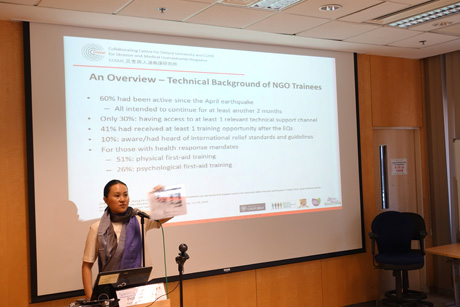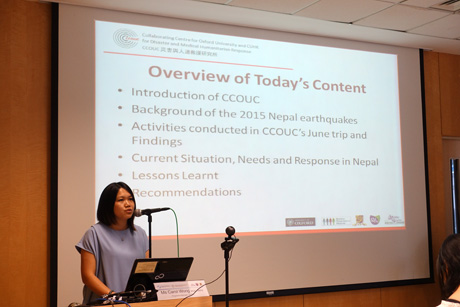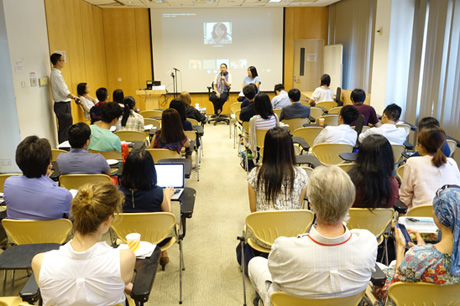Two months after the 7.8 magnitude earthquake struck Nepal, the CUHK Centre for Global Health and CCOUC jointly hosted a seminar on 30 June 2015 to discuss the humanitarian situation in Nepal witnessed by recent CCOUC mission to the country. Presentations were delivered by the mission head Professor Emily CHAN, Director of both CCOUC and CGH, and Ms. Carol WONG, Programme Manager of CCOUC. Some 57 local and international participants attended the seminar, including representatives from Harvard University, the University of Hong Kong, the Hong Kong Jockey Club Disaster Preparedness and Response Institute (HKJC DPRI) and Chinese Center for Disease Control and Prevention (China CDC). In addition, colleagues from Harvard University, the University of Western Australia and Japan joined the seminar and discussion via online video-conferencing.
After giving an overview of the earthquake and its impact on the country, Ms Wong discussed the activities which took place during the CCOUC team’s recent mission to Nepal, from the 14th to 18th June. During their visit, the team provided critical NGO training for frontline humanitarian workers from international and local organisations such as OXFAM, Plan International, and the United Nations Development Programme (UNDP). In addition, they carried out needs assessments in various urban, suburban and rural districts of Nepal and met with community members devastated by the disaster.
Professor Chan further analysed the current situation and needs of responders in Nepal. She challenged the audience to examine how public health practitioners might play key roles in humanitarian work on the ground as the response shifts from short-term relief to longer-term reconstruction and rehabilitation concerns. In doing so, she outlined CCOUC’s strategy for facilitating capacity-building activities to enhance community health resilience in some affected communities over the coming months. In addition, she highlighted the need to use local research to predict post-disaster community-level health risks, using the high Hepatitis E prevalence-level in Nepal as an example. Professor Chan also noted the gaps in training of local NGO responders: out of those surveyed, only 30% had access to relevant technical support channels and barely 10% had heard of international relief standards and guidelines.
The two presentations were followed by a stimulating and lively discussion by audience members, several of whom had witnessed the devastation first-hand or even participated in relief efforts immediately after the earthquake hit. Some participants highlighted the tension in finding the balance between providing relief in a timely manner whilst still needing to collaborate with other parties. Whilst NGOs were criticised for piecemeal, isolated and un-coordinated response in the Typhoon Haiyan aftermath in the Philippines (November 2013), it was argued that the increased cautiousness of responders led to severe delays in the response efforts in Nepal, which had a strong negative impact on the situation. Other participants noted the critical need for psycho-social support for survivors and commended the resilience and spirit of the Nepalese people against such adversity. The discussion also centred around the need for inter-organisational coordination and information sharing, in addition to the potential for technology and social media to shape more effective disaster response efforts in the future.
In this seminar, faculty members, students and active members of the humanitarian community were able to consider the complexity of the post-earthquake situation in Nepal as it shifted from a short-term relief phase toward longer-term rehabilitation and reconstruction. CCOUC plans to return to Nepal in the coming months to facilitate capacity development and empowerment activities for grassroots NGO partners in the country.
 |
 |
 |